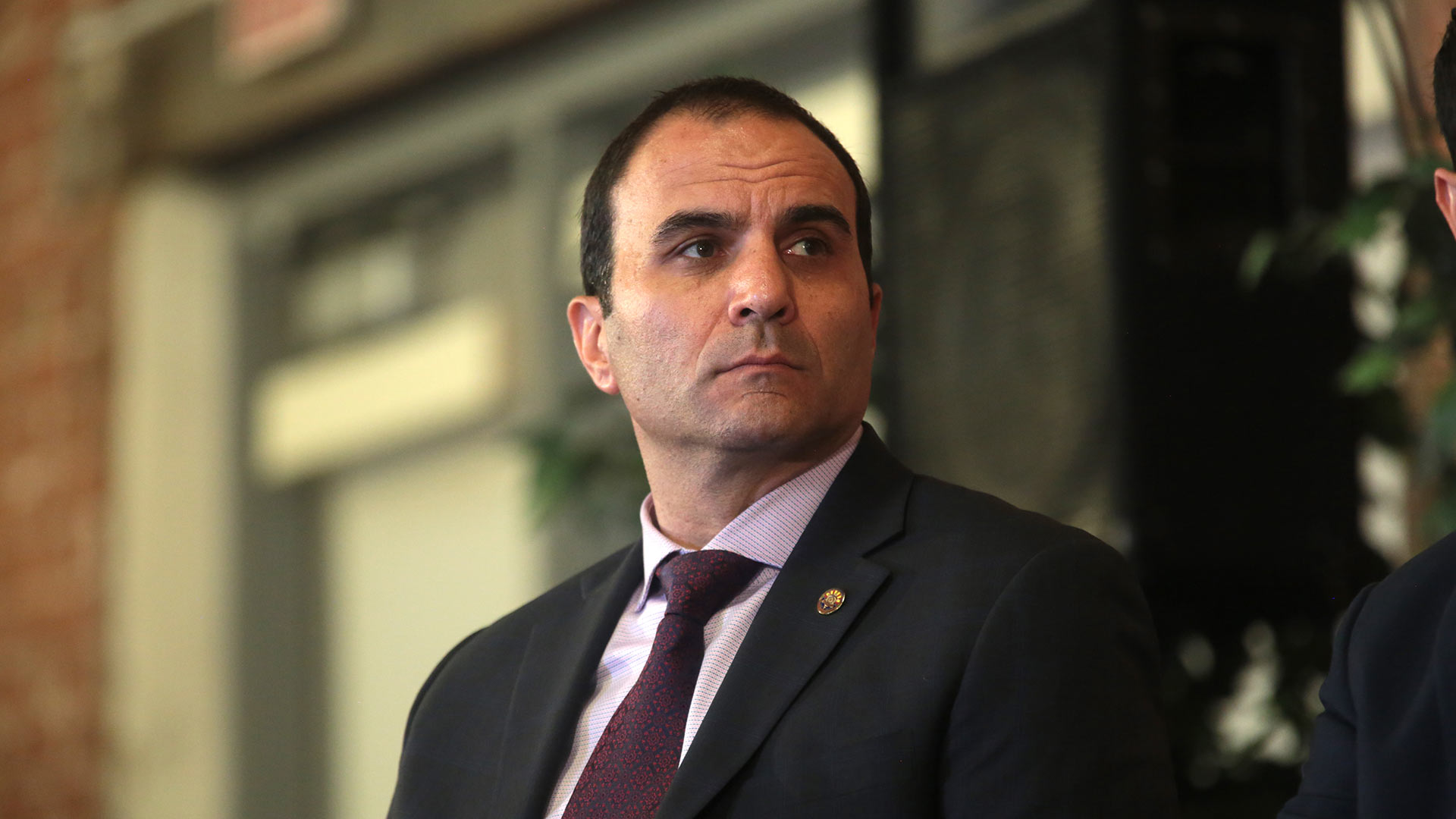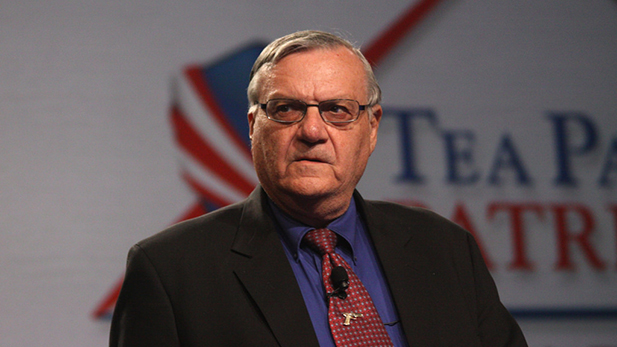 Maricopa County Sheriff Paul Penzone in Phoenix, April 2018.
Maricopa County Sheriff Paul Penzone in Phoenix, April 2018.
PHOENIX — Two years after defeating longtime metro Phoenix Sheriff Joe Arpaio, Paul Penzone is steadily making progress in carrying out a massive court-ordered overhaul of a beleaguered agency that was found to have racially profiled Latinos.
The new sheriff has improved compliance with the overhaul and taken far more steps to repair relations with the Latino community than the famously defiant Arpaio. The agency now acknowledges on its website that its officers engaged in racial profiling, whereas Arpaio vigorously disputed until the end of his 24-year tenure that his deputies singled out Latinos during traffic patrols that targeted immigrants.
Still, the sheriff's office isn't close to being released from court supervision and doesn't appear to have completely stomped out its problem with biased policing, even though the overhaul was ordered five years ago and taxpayers have shelled out $90 million in legal and compliance costs.
The latest audit of traffic stops by Maricopa County deputies concluded Latinos and other minorities are treated differently than whites. It found, for instance, the average length of stops for Hispanic drivers is three minutes longer than for white drivers.
The taxpayer spending is expected to continue until the sheriff's office is fully compliant for three straight years, and the agency hasn't yet been deemed totally in line with any phase of the overhaul. The court ordered overhauls of both the agency's traffic patrols and internal affairs.
Penzone, like Arpaio, also has been criticized for letting federal authorities into his jails to check the immigration status of arrested people to see whether they should be transferred into federal custody once released. The overhaul didn't address jail checks, but critics say the practice serves as a pipeline for deportations that are financial and emotional hardships on immigrants' families.
"[Penzone] isn't out there saying things really punching at the community like Arpaio. But, indirectly, he is still playing some of the same games," said Sylvia Herrera, who serves on a community advisory board set up to help improve trust in the sheriff's office.
Penzone says it's unrealistic to expect him to undo problems stemming from Arpaio's more than two-decade tenure in less than two years. "But that doesn't mean we aren't changing the culture and retraining deputies so they are lawful and ethical," he told The Associated Press.
"[Penzone] isn't out there saying things really punching at the community like Arpaio. But, indirectly, he is still playing some of the same games" — Sylvia Herrera.
Giving federal Immigration and Customs Enforcement employees access to jails is a lawful way of addressing immigrants who are in the country illegally and commit crimes under state law, the sheriff said. He said his office has a responsibility to work with other police agencies.
Arpaio was criticized for dragging his feet in abiding by court orders, failing to express regret for his immigration crackdowns and making lackluster attempts to repair the agency's relations among Latinos. Ultimately, he was convicted of criminal contempt of court for his acknowledged disobedience of a 2011 court order in the profiling case to stop his immigration patrols, though a pardon by President Donald Trump spared him a possible jail sentence.
Penzone, in contrast, campaigned on making compliance and controlling the case's costs top priorities. While Arpaio objected on First Amendment grounds to a requirement that he hold community meetings to try to build public confidence in the agency, Penzone successfully sought permission from the court to take over the gatherings.
A court-appointed official who monitors the sheriff's office on behalf of the court has deemed it 85 percent compliant in the first phase of its traffic-operations overhaul and 66 percent compliant on the second phase. The agency is around 80 percent compliant on both phases of the overhaul to its internal affairs operations, which was criticized during Arpaio's tenure for biased decision-making and shielding sheriff's officials from accountability.
 Maricopa County Sheriff Joe Arpaio in 2011.
Maricopa County Sheriff Joe Arpaio in 2011.Lydia Guzman, a longtime Arpaio critic who serves on the community advisory board, said the new sheriff is making solid progress at rebuilding trust within the Hispanic community.
Penzone had dispatchers retrained to screen out race-based calls that don't allege criminal conduct, so officers won't be sent out if no crime or genuine public safety concern is reported. The court didn't require the training, but Penzone thought it was important, Guzman said.
She doesn't think federal authorities should be stationed in the jails but noted Penzone has stopped Arpaio's practice of holding immigrants for up to 48 hours after their ordered release until federal authorities could pick them up.
Lydia Guzman, a longtime Arpaio critic who serves on the community advisory board, said the new sheriff is making solid progress at rebuilding trust within the Hispanic community.
Despite the agency's improved compliance on patrols, a traffic-stop audit conducted by Arizona State University researchers as part of the profiling case concluded Hispanic drivers are more likely to be searched and arrested by sheriff's deputies than white drivers.
It found the average length of traffic stops for Hispanic drivers has steadily declined since the overhaul began. But the average time of stops for white drivers is 12.7 minutes, compared with 15.8 minutes for Hispanics.
The report — the latest publicly available traffic stop analysis for the agency — examined 22,000 stops from July 2016 through June 2017, covering the last six months of Arpaio's tenure and Penzone's first six months in office. It suggested a systematic bias within the traffic patrol division was to blame.
However, fewer than 20 of the 240 officers who typically do traffic enforcement for the sheriff's office have been flagged for having statistically significant differences from their peers in how they treated Hispanics. Penzone said his office is either working with these officers to correct the problems or getting rid of them.
No one can say how long it will take the agency to reach full compliance, but Penzone said it's working toward asking the court at some point in the future to consider releasing it early from supervision.
In the meantime, the court-appointed monitor keeps a close eye on the agency, assessing its compliance with court orders; evaluating its supervisory changes; making unannounced site visits; deciding whether the office is engaged with communities affected by its past violations; and approving transfers of officers and supervisors in and out of its internal affairs operation.
"You can't be effective and truly healed until federal oversight is removed," Penzone said.
Kathy Brody, one of the American Civil Liberties Union attorneys who led the profiling case against the sheriff's office, said Penzone is earnest in his efforts to change an office that encouraged discrimination against Latinos. But she doesn't feel the agency is ready be released from supervision.
"It takes a lot of time to turn that around," Brody said.

By submitting your comments, you hereby give AZPM the right to post your comments and potentially use them in any other form of media operated by this institution.